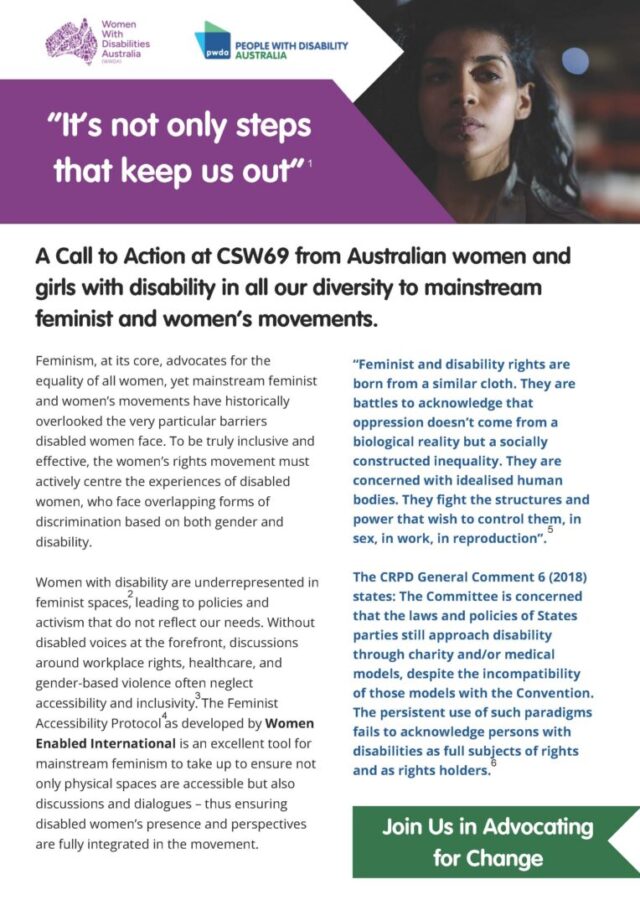8 April 2025

Feminism isn't inclusive until it uplifts all women – disability rights are women's rights!
People with Disability Australia (PWDA) President Trinity Ford represented PWDA at the United Nations sixty-ninth session of the Commission on the Status of Women (CSW) at UN Headquarters in New York in March.
This was a critical opportunity to ensure Australian women with disability were represented and to advocate for their meaningful inclusion in global policy discussions.
Together with Women with Disabilities Australia we produced a flyer and distributed it as part of our joint advocacy efforts to ensure mainstream feminist and women's movements actively include and centre the experiences of women and girls with disability in all our diversity.
To achieve true equality, these movements must adopt the Feminist Accessibility Protocol, amplify disabled women's voices, and ensure that policies and advocacy efforts reflect the specific challenges we face, including barriers to reproductive rights, bodily autonomy, and freedom from gendered violence.

A Call to Action from Australian women and girls with disability in all our diversity to mainstream feminist and women's movements.
A women's rights movement that excludes or sidelines women with disability is incomplete. To uphold the Beijing Declaration and Platform for Action as well as the Sustainable Development Goals, the women's rights movement must actively address the specific challenges faced by women and girls with disability in all our diversity. This means amplifying our voices, advocating for policies that support us, and ensuring accessibility in feminist and women's rights spaces. True liberation, equality and freedom from violence is only possible when all women, including women with disability, are included.
We urged CSW69 delegates to commit to:
- Pledging to the Feminist Accessibility Protocol as laid out by Women Enabled International.
- Prioritise leadership of women with disability in all our diversity in the feminist and women's movements.
- Ensure that women with disability in all our diversity are located centrally in policy and legislation and not as an "aside" cohort.
- Prioritise shared-decision making, representations and special measures to address to needs of Indigenous women, including those with disability.
- Support the CEDAW + CRPD Committee's Joint Statement on Regression of Reproductive Rights.
- Acknowledging that without prioritising the dismantling ableism, oppression will remain for all women.
Better Protections for Transgender People
During the session, Trinity asked a question of the Nordic Ministers for Gender Equality on how they can better protect the rights of transgender people who are currently facing persecution.
Right now, across parts of the world - especially in the United States - transgender and intersex people are facing a rising wave of laws and policies that are doing real harm. This is systematic, widespread, and coordinated.
We're seeing governments ban gender-affirming healthcare, punish families for supporting their trans children, and roll back basic anti-discrimination protections. In some states, parents have been investigated for "child abuse" just for helping their child access the care they need. In others, children are being forced through puberty they don't want, denied the right to change their name or pronouns, and treated as if they don't exist.
We're seeing laws that segregate trans people from public life - bans on using bathrooms or change rooms that match their gender. In some countries, intersex people still face non-consensual surgeries to "normalise" their bodies, often in childhood.
Trinity's question to the Nordic Ministers for Gender Equality
My question is about how states like yours can better protect transgender people. Because we are currently subject to a widespread and systemic attack, severely depriving us of our fundamental rights on the basis of refusing to perform the binary gender roles wrongly assigned to us. In certain contexts, this persecution rises to the level of a crime against humanity under the Rome Statute of the International Criminal Court, namely prison, rape and detransition, torture and forced sterilisation and child removals.
Watch the video:
Persecution as a human rights violation
Trinity highlights how the ongoing, widespread persecution of trans people is not just as a moral issue, but as one that may meet the legal threshold of crimes against humanity under international law.
Under the Rome Statute of the International Criminal Court, such persecution could be considered a crime against humanity - similar in legal terms to genocide, even if the target isn't an ethnic or religious group. Legal experts like Dr Valérie Suhr have outlined how laws targeting trans people align with international definitions of persecution, torture, forced transfer, and even extermination - especially when these policies knowingly increase risks of suicide or violence.
Trans communities are facing serious human rights violations - including imprisonment, forced detransition, torture, and even child removal - which may amount to crimes against humanity under international law.
Trans and intersex people are asking the global community to take this seriously: to apply international law, protect vulnerable communities, and ensure that persecution doesn't go unchecked.
Representatives from Norway and Sweden acknowledged the rising hostility and discrimination against trans people, even in places known for progress on LGBTQ+ rights. They stressed the importance of not taking past gains for granted and the need to keep pushing forward, despite the backlash.
The message was clear: the fight for trans rights is far from over, and governments must step up with real action and solidarity. As one speaker put it, "If they thought we'd back down - they don't know who we really are."
Ends | Contact us






